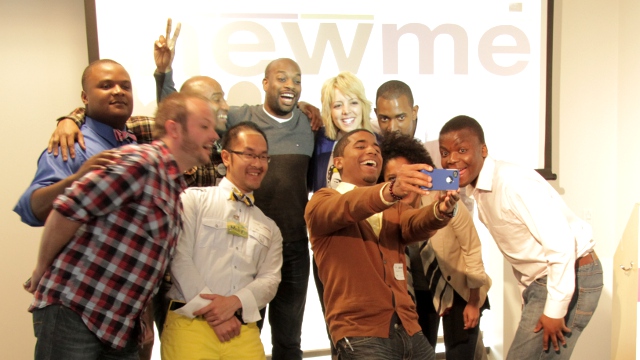“I was the first one to go, I had no idea what to expect,” she recalled. “And I was terrified, right? I was terrible. Really bad!”
In Silicon Valley, the pitch is everything. It’s how you create buzz about your company and how you convince investors to write you checks.
Women bring in less investment
And for women, in particular, this is key. According to one recent report, fewer than ten percent of tech companies are started by women. That has a lot to do with the fact that there are fewer women in university computer and engineering programs.
But when women do start companies, they attract half the outside capital that male-owned firms bring in, according to one report.
The pitch is central to attracting investors. And it makes Amanda McClure uncomfortable.
She and Rachel Brooks are the two women participants in NewME. She says she understands it’s important to be succinct. But there’s something about the pitch with all its bluster and swagger that she doesn’t relate to.
“I mean, how would you describe Facebook in two minutes?” she says. “From a female’s perspective, it’s almost a platform for competition. Like who’s the winner? It feels like an ultra-masculine environment.”
Heidi Roizen says she hears from women like Amanda all the time.
Roizen started out as an entrepreneur in the Valley in the 1980s. Today she’s a venture capitalist and she also coaches would-be entrepreneurs at Stanford University.
“I think you can group women entrepreneurs and you can find things they do that are very different. They're uncomfortable not knowing an answer, they are uncomfortable taking credit, and they are uncomfortable making bold statements.”
Roizen emphasizes that she’s generalizing here. Many, many women don’t fit that mold at all.
Heidi vs Howard
But she says when women do succeed, they face a different reception in the business world.
In fact, Roizen herself helped demonstrate this.
A few years ago, a Harvard business school professor did an experiment. He took Heidi’s career, her resume, essentially, and taught it to two groups of students. With one difference: He taught one as the Heidi Roizen case, and he taught one as the Howard Roizen case.
Then the professor asked each group: Would you hire this person?
Howard and Heidi, said the students, were equally competent. But, recalls Roizen, “Howard was more likeable. A person you felt like you could work with. A person you felt like you could trust.”
In the student’s eyes, Heidi’s success made her seem aggressive, self-promoting.
I asked Roizen how this made her feel, after all, the students were evaluating her.
She sighed. “You know, how can you be pissed off? It's reality.”
“I guess it made me think, ‘Hey, I did even better than I thought because there was this bias against me. But some people are for you and some people are against you, no matter what you are or who you are.”
Roizen says women like Rachel Brooks and Amanda McClure have one good option: To ignore whatever bias may be out there. To take the fact they’re a minority in the Valley, and use it to their advantage.
“If you're the only woman in the room and you raise your hand, there's a good chance your question is going to get answered,” says Roizen. “If you wait afterwards and go meet the speaker, there’s a good chance you’re going to meet the speaker. You stand out.”
Perfecting the pitch
Over the course of NewME’s three-month program, the participants have plenty of opportunities to stand out. They make the rounds of all the big Silicon Valley companies. They have sit downs with venture capitalists, mentors from dozens of companies, including NewME’s founders, which include Google and Hewlett Packard.
And all that coaching? It seems to pay off.
In the last week of the program, Rachel and the others get another chance to pitch their companies, this time at Google’s San Francisco office.
In the audience are representatives from at least three venture capital firms.
Brooks sounds much more confident. The notebook is gone. One by one, the founders, all women or African American, make their pitches with confidence and a little bit of swagger.
Two weeks after the NewME program wraps up, it’s too early to tell which of these companies will succeed. Three have pulled in some investment -- nothing huge, but a start.
Rachel and Amanda, along with their teammates, are still paying their own way. They’re forging ahead, living cheap, building their companies and getting customers. They say they’re in this for the long haul.
